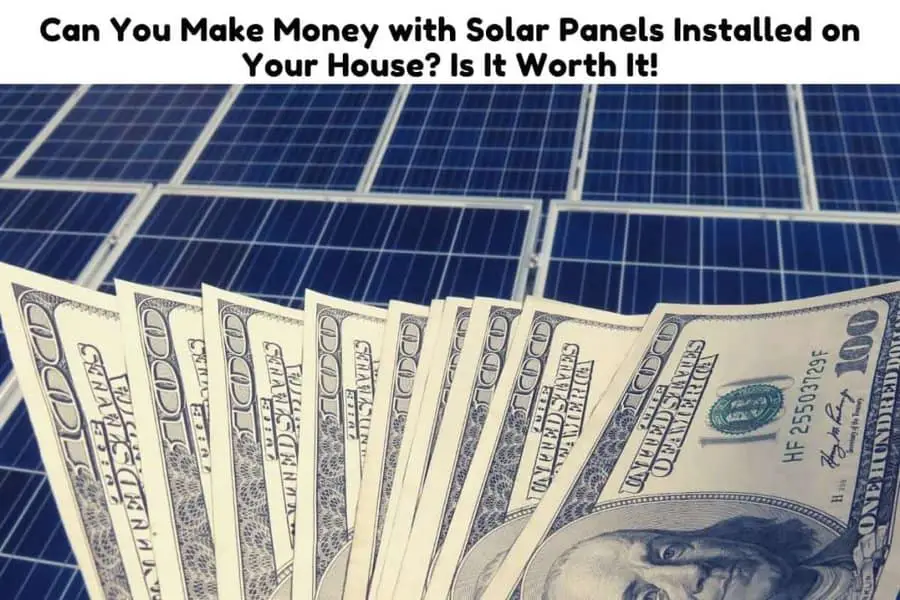Homeowners can make money with solar panels. Solar has grown at a rate of 33% per year in the last 10 years. In 2021, the American economy saw $33 billion in private investment generated by the solar industry. Falling prices and rising consumer awareness have been the key drivers of growth.
Homeowners can cash in on this trend by installing solar. With incentives like federal tax credits, state rebates, and net metering, there are several opportunities for a homeowner to save money by putting solar panels on their roof.
In this article, we will explore these opportunities. We will look at how long it takes before a solar roof pays for itself. We will also look into how you get paid for your solar power. Do you get cold, hard currency or does payment come in another form? Finally, we will look at solar farms and what they are.
If you are on the fence about solar panels and what their return on investment is, then read on to find out what you stand to gain or lose.
On a side note! If you’re in need of a reliable and high-performance portable solar panel, We strongly recommend the Jackery SolarSaga 100W Portable Solar Panel (Amazon Link).
With a high conversion efficiency and foldable design, this solar panel is easy to transport and set up, making it perfect for outdoor activities like camping, hiking, and RV trips.

The US solar cell technology used in this panel ensures that you get the most efficient and reliable solar charging possible.
There is also a 60W option that is more affordable (Amazon Link)

Are Solar Panels Worth It?
The average solar system costs around $20,000. While it is an expensive investment, it is one you will see returns from typically within 10 years. Solar panels are a cheaper energy source that reduces your electricity bills. They provide you with a consistent power source in the event of a blackout and tax rebates can reduce the total cost of a solar system by up to 30%.
For more on this, we recommend that you check out our post How Much Does A Solar Roof Cost? Is It Worth It?! (VS Solar Panels)
There are several reasons why solar is an attractive alternative energy source. For one, energy prices are set to continue to rise. Fossil fuel-generated electricity costs for the average homeowner rose by $5 per month in 2021. (Source)
Also, check out If Solar Panels Work During a Power Outage? What Happens!
How Much Money Can I Make with A Solar Roof?
The money you make with solar comes in the form of savings. These savings come in the form of tax rebates on the solar system, a reduction in your electricity bill, and energy credits from net metering.
Tax incentives
Solar owners can claim federal tax credits of up to 23% (if they are eligible) until the end of 2023 when the program expires. There are also state and county-specific rebates and grants which can be deducted from the cost of your solar system.
Rebates have historically reduced the cost of a solar system by an average of $3,000. You can check which rebates apply to you here. (Source)
For more on this, check out our post “Do Solar Panels Increase Property Taxes? What You Need To Know !“
Reduced electricity bill
The average homeowner in the U.S spends $1,420.32 per year on electricity. Depending on the size of your system and where you live, solar panels can save you as much as $1,500 per year on your electricity bill. That means it can eliminate your bill. You can check how much you can save by using Google’s Project Sunroof here. (Source)
Net metering
Net metering is selling your excess electricity to your power utility. With net metering, the utility lowers your electricity bill depending on how much electricity your solar system fed to the grid. Net metering is under lobby by power utilities so it may change in the future.
If, however, you go solar before changes are made to the current arrangement you will be grandfathered in under the present terms for the next 20 years. Net metering specifics vary depending on where you are. You can check which regulations apply to you here. (Source)
Also, find out How Much Do Solar Roofers Make? All You Need To Know!
How Do I Get Paid for My Solar Power?!
Payment from solar power is primarily through savings. This is through savings on the upfront cost of a solar system through tax rebates and the reduced cost of electricity over the lifespan of a solar system. You also receive buy-back credits from your power company for the excess electricity your system feeds into the grid.
A solar system can reduce your expenditure on electricity to almost nothing. Homeowners pay an average of $118 per month. If your solar system reduces your bill down to zero that’s $100 in your pocket that you can use elsewhere.
How Long Does It Take Solar Roofs to Pay for Themselves? Contributing Factors Listed!
Solar can take anywhere between 3 to 10 years to pay for itself. The solar payback period depends on several factors including the size of the system, where you are, and the system cost.
Size of the system
A larger system will have a higher upfront cost but it will also produce more energy. The more electricity it produces the less money you spend on electricity. Generally, a larger system will pay back faster than a small one.
Your location
Your location determines how much electricity your system produces. A system in Arizona will produce much more energy than one in Alaska since it is sunnier in the former. The more energy your system produces the shorter the payback period will be.
System cost
The most important factor is the upfront cost of the system. The less expensive it is, the shorter the payback period will be. The cost of the system will be determined primarily by what type of system it is. Grid-tie systems are smaller so they cost less.
Federal and local tax rebates can knock off as much as 30% of the purchase price. You can reduce the total cost of the system by a further 10% if you decide to install your solar system yourself. DIY solar installations can pay for themselves in about 5 years.
Solar costs up to $3 per watt and solar contractors charge between $0.75 to $1 per watt for installation. (Source)
Are Solar Farms Worth It?
Solar farms are 30% cheaper to build than rooftop solar installations. Residential solar systems cost up to $3.06 per watt while solar farms cost $1.01 per watt. You can earn up to $40,000 per year by selling electricity from a 1MW solar farm or between $250 to $3,000 per acre per year by leasing your farm for solar.
How much you earn with a solar farm depends primarily on the size of your farm, the infrastructure to distribute the energy generated, and the demand for renewable energy.
Solar farms or solar power plants are large-scale solar installations. They can either provide energy to a small community or act as a large utility-scale provider.
